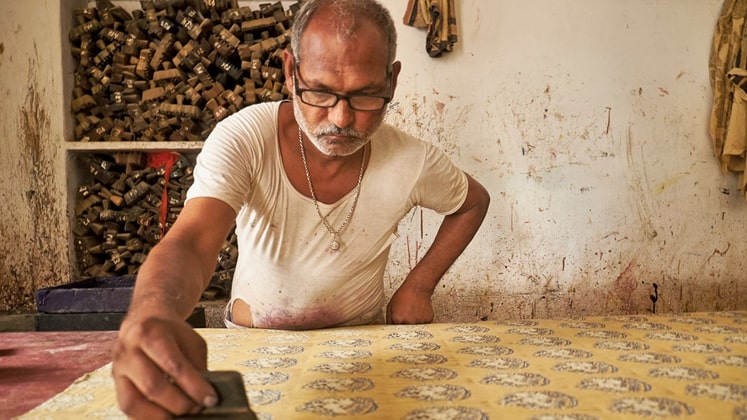Handloom Textiles constitute a timeless facet of the rich cultural heritage of India. As an economic activity, the handloom sector occupies a place next only to agriculture in providing livelihood to the people. The element of art and craft present in Indian handlooms makes it a potential sector for the upper segments of the market, both domestic and global. However, the sector is beset with manifold problems such as obsolete technologies, unorganised production system, low productivity, inadequate working capital, conventional product range, weak marketing link, overall stagnation of production and sales and, above all, the competition from the mill sector.
Add to that the fact that artisans don’t get their dues for their sheer skills. Being largely an unorganised sector, it is not every day that one comes across a brand or marketplace making a conscious effort to operate under a business model not only successful for them, but also for the hundreds of artisans that are, for the most part, cheated by conglomerates or even local retailers of a fair remuneration.
Despite what may seem like a gloomy reality for most hard working artisans, there have been multiple efforts by the Government as well as some private companies to uplift the sector. In fact, according to a report by Federation of Indian Chambers of Commerce and Industry (FICCI), the exports of the Indian handloom products were valued at US$ 353.9 million in 2017-18 making India the second largest exporter of such products in the world. In last five years, India has exported over US$ 1.8 billion worth of handloom products. Over 125 countries globally purchase handloom products from India.
However, come the pandemic, the situations have become bleak. To get an idea of what the handloom and handicraft industry is reeling through, we spoke to Akansha Dixit, Co-Founder and CEO of Craft Maestros.
“The current situation of the handicraft and handloom industry in India is quite shaky. The sector is largely unorganised and has been deeply impacted due to the Covid crisis. It is the second largest employer in the country, providing livelihood to about 7-9 million people, many of whom are women. It contributes nearly Rs.25,000 crore to the Indian economy and nearly Rs.10,000 crore in export earnings. The industry is a treasure trove of Indian arts and techniques, many of whom have been handed down over generations. Younger artists today are trying to balance tradition, while catering to modern design requirements and customer demands. Because of its unorganised nature, supply chains remain weak, but there are several organisations and companies like Craft Maestros, who are looking to rectify this and bring the best of India to the global customer,” she avers.
Reclaiming respect for lost art
While the pandemic was tough on all of us, it was tougher for artisans who were robbed of their primary sources of income as tourism and retail slowed down to a never-before-seen level. Moreover, it is already quite a struggle to be able to find genuine sources to purchase top-quality handloom products. The upsurge of e-commerce has rendered some relief to these artisans by taking their work to the masses who live in areas inaccessible for local artisans.
The Indian e-commerce industry is the fastest growing and most exciting channel for commercial transactions. The market is expected to grow to US $ 200 billion by 2026 from US $ 48.5billion as of 2018. This growth has been catapulted by increasing internet and smartphone penetration.
In keeping with this, it would be unfair to keep the handloom industry from benefiting through the sheer force that is e-commerce. Even the biggest names in tech have taken notice. Microsoft India has launched a new e-commerce platform ‘re-weave.in’ for handloom weavers under its Project ReWeave, as part of its philanthropic initiatives. This e-commerce platform will help connect artisans to buyers directly, enabling them to expand to newer customers and markets.
Another up-and-coming platform is Craft Maestros which is giving artisans a respectable avenue of remuneration by partnering with 50 nationally awarded craftspersons, Shilp Gurus, Sant Kabir and Padma Shri Awardees, from across India and it has launched 15 exquisite crafts on its website. As more crafts are being added to its repertoire, the company aims to make a perceptible difference in the lives of its craftspersons and create the right environment for the next generation of artists to take the mantle of their respective crafts.
To make sure its customers are offered only the most authentic products, it sources directly from artisans practising the art in their native regions. What’s more, customers can choose from a wide variety of handicraft and handloom products, ranging from the home decor (decorative accents, table lamps, wall hangings, artwork), home furnishing (table and bed linen, cushions, carpets), apparel (saris, dupattas, shawls and stoles), jewellery (meenakari, thewa, bone carving and beaded jewellery) to accessories like stationery products and hairpins. In fact, there are even some unique products available on the website including aksi embroidered accessories, thewa jewellery, in-lay on recycled wood, gemstone carving and relief work.
However, getting the right product or even manufacturing it authentically can be a tough feat. To that Dixit says, “We don’t manufacture anything in-house, but will be venturing into exclusive designs shortly. We keep an inventory of some bestsellers and fast-moving products, but most products are shipped directly from the artisans’ workshops to your doorstep. We have worked extensively with the artists on aspects of quality checks, consistency and service delivery. We are very proud of the integrated order platform that we have built. This allows our artisans to have the same level of transparency of their account as we have on our end. I believe that this has been a critical element in helping us gain their trust and ensure a positive order fulfilment experience for our customers.”
She comes with a background of 17 years in the apparel industry, spanning sourcing, merchandising and quality, and has a vision to create a paradigm shift in this sector.
Also Read: NGOs are supporting jobless workers but efforts need to scale up
A win-win situation
Consistency is what lends uniqueness and stability to a brand and while artisans from all over the country might have different design languages, it is up to the platform to provide them with resources such as market research and financial aid to bring out designs that will suit the appetite of the Indian and global consumer.
As much as design, quality is of essence and for that Craft Maestros trains each artisan on a set of quality control guidelines that are specific to its product. It even deploys teams, who visit workshops and conduct a final quality check before the product gets shipped out.
To ensure both quality and quantity, it only seems fair to provide the artisans with what is their due. Not being able to receive fair wages, nearly 27.83 lakh handloom households are engaged in weaving and allied activities, out of which 87 per cent in rural areas and the remaining 13 per cent in urban areas suffer. To help this injustice, the company keeps low markups and has forsaken the percentage model to ensure pricing that artisans also have control over.
Additionally, in an effort to provide financial support during tough times, the bootstrapped company has started its very own programme Support the Artisan. “In May-June of last year, we ran a ‘Support the Artisan’ campaign, where we asked our supporters to contribute towards a future purchase, so that the looms and workshops of our artisans could continue operating, despite the lockdown. The campaign saw a positive response and resulted in the artisans continuing to have a stream of work,” exclaims Dixit.
What lies ahead?
As more and more companies wake up to the value of these crafts, several of them have dedicated their sole effort to bring them out of obscurity.
Amazon introduced the ‘The Handloom Store’ on its website apart from conducting a ‘Handicrafts Mela’ last September-October to encourage more people to familiarise themselves with such treasured arts. In an attempt to take bigger space in the growing fabric market, the state handloom cooperative society (APCO) has set its focus on creating new designs by following latest global fashion trends. APCO has already signed an MoU with online channels such as Amazon and Flipkart, amongst others, and will be holding training sessions for weavers to recognise latest designs. Several cooperatives and Governments in handloom-rich states have initiated programmes to train artisans to keep up with times and evolving consumer needs.
This is in addition to players like Lal10 which have banded together groups of artisans to sell their products B2B across the country as well as to international markets. Others like Bhashabharat, Gatha, Okhai and Kashmir Box focus on a particular handloom and handicraft or on being an amalgamation of the best India has to offer.
To keep the ball rolling, Craft Maestros has also laid out its plans to capture not only global and urban audiences, but also rural consumers who might not yet understand the value of this sector. “While in the near-term, our focus will remain exclusively on the Indian sub-continent, we plan to bring our customers exclusive handicrafts from across the world. Over the next year, you will be seeing us in several roadshows as we traverse the length and breadth of the country. We have partnered with State Governments to make this happen. We have also formed partnerships with a leading lifestyle and event management company, which will see our product co-branded at their exclusive events,” says Dixit.










